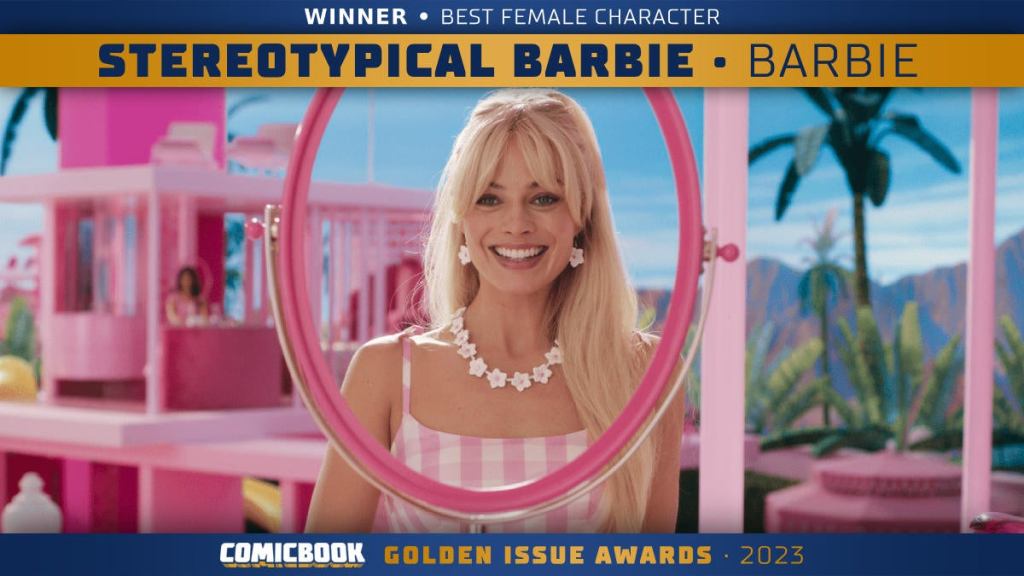We’re nearing the end of 2023, and many are already growing nostalgic for elements from the past twelve months. In the world of movies, the past year has delivered plenty of bright spots, with major blockbusters and smaller-scale stories both capturing our attention. In particular, the movies of 2023 have introduced (or, in some cases, reintroduced) a slew of female characters for us to root for or be surprised by. Our annual Golden Issue Awards, which are voted on by ComicBook.com’s staff, have continued to celebrate these heroines for several years now — and this year, only one could reign supreme.
Videos by ComicBook.com
And the winner for the 2023 ComicBook.com Golden Issue Award for Best Female Character is…

Stereotypical Barbie, from Barbie!
In recent years, one of my favorite things about working in this industry has been witnessing the tidal wave of anticipation towards the Barbie movie. It was easy to see why there was some initial skepticism, as since her creation in 1959, the iconic doll had accumulated a history dotted with contradictions. Barbie was both trailblazing and quaint, meaningful and frivolous, inspirational and demoralizing — and as a possible film adaptation had languished in development with everyone from Anne Hathaway to Patty Jenkins to Amy Schumer attached, it seemed difficult to turn all of those contradictions into blockbuster entertainment. Eventually, the world began to see the Barbie movie as a worthwhile venture, with the help of absurd paparazzi photos taken on the film’s set, followed by several glorious, candy-colored trailers, and the later rollout of a fizzy soundtrack of original pop songs and countless pieces of tie-in merchandise. For me, the moment I knew the Barbie movie would work occurred all the way back in the fall of 2018, once Margot Robbie was reported to star in and produce the film.
All these years later, it can be argued that, even amid the countless impressive technical elements and whip-smart dialogue from Greta Gerwig and Noah Baumbach, Robbie’s performance helps Barbie crystalize into the masterpiece it is. Stereotypical Barbie (given that name because she has every quality of the most basic, easily-purchasable Barbie doll) goes on an adventure that can be boiled down to a stereotypical hero’s journey. After Stereotypical Barbie begins malfunctioning in the pristine and pleasant world of Barbie Land, she ventures to the “Real World” to find the person who is playing with her — an experience that opens her up to feeling discomfort, depression, and a slew of other human feelings for the first time. Once she returns to Barbie Land and helps prevent the Kens from permanently installing a patriarchy, she realizes that she’s more multifaceted than she thinks, and wants to further explore that as a human in the Real World.
Prior to the film’s release, Robbie compared that arc to Buddha’s journey of enlightenment — and honestly, that’s not unfair in context. By virtue of her entire gimmick, Stereotypical Barbie was never going to capture the experience of every single viewer watching the movie, something that only became more true as word of mouth (and the film’s box office) grew. But it became easy to see some sliver of yourself in Stereotypical Barbie’s story, whether through her joy, her pain, her insecurity, or her reclamation of her own life. Even Barbie‘s two most poignant scenes — Stereotypical Barbie wordlessly and tearfully processing humanity’s emotions when she first arrives in the Real World, and her and Ruth Handler (Rhea Perlman) seeing visions of girlhood in the void between the two worlds in the film’s penultimate scene — feel especially resonant after all that we’ve collectively endured over the past few years.
That profound arc being inside of something as gleefully outlandish as Barbie certainly isn’t impossible to believe, but Robbie’s performance, which graciously tightropes between absurdity and rationality, helps further sell that dichotomy. It helps that Robbie has a fascinating chameleon-like quality to her roles — yes, we know that’s her as Harley Quinn or Tonya Harding or Sharon Tate, but we’re able to get lost in the bizarre specificity of her portrayal. Stereotypical Barbie has that feeling in spades (even as the movie briefly breaks the fourth wall to acknowledge how flawless Robbie is in real life), with little details like her lifeless eyes while driving her Barbie car, or the movie magic of her foot standing straight without a high heel. Even her delivery of some of Barbie’s wackiest lines is nothing short of magnificent — her sobbing while acknowledging that she can’t be a fascist because she doesn’t “control the railways and the flow of commerce” has lived rent-free in my head since the film’s opening weekend.
This time last year, as the first Barbie trailer was playing before showings of Avatar: The Way of Water, I was already confident that the film — anchored by Robbie’s performance — would be something special. What I wasn’t prepared for was just how much that specialness would resonate, with a billion-dollar gross and genuine Oscar buzz and a reported uptick in women divorcing their husbands. Robbie’s embodiment of Stereotypical Barbie became monoculture, joining Taylor Swift and Beyonce’s concert tours in helping us better embrace the joyous and weird complexities of the feminine. On the big screen, in particular, Stereotypical Barbie proved that a female character doesn’t have to be a badass action babe or a tortured tragedy to resonate with mainstream audiences — she can just be. Birkenstocks and all.
The nominees for the 2023 ComicBook.com Golden Issue Award for Best Female Character are:
Ariel (Halle Bailey, The Little Mermaid)
Carol Danvers / Captain Marvel (Brie Larson, The Marvels)
Kamala Khan / Ms. Marvel (Iman Vellani, The Marvels)
Nimona (Chloe Grace Moretz, Nimona)
Stereotypical Barbie (Margot Robbie, Barbie) — WINNER








